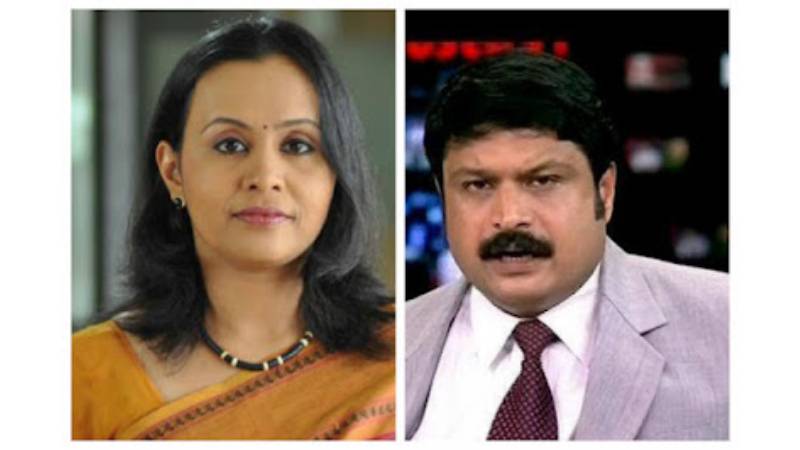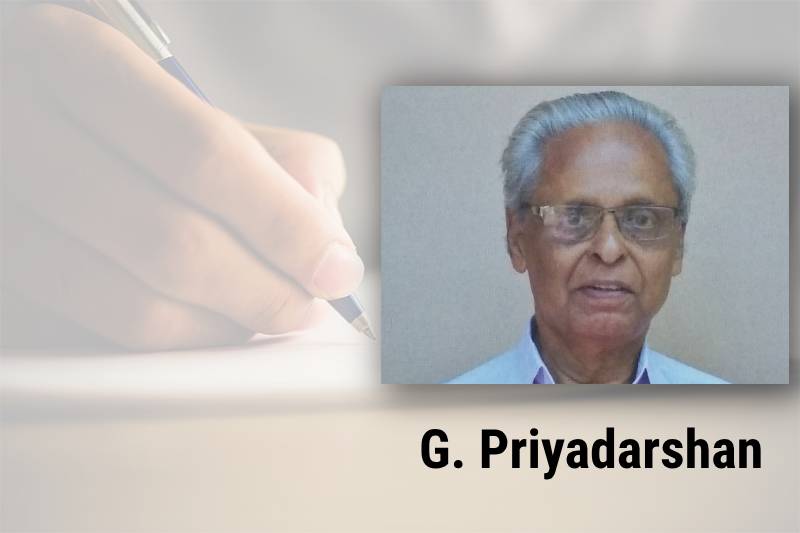It is indeed news that M.V. Nikesh Kumar, one of Kerala’s eminent mediapersons, is going to contest the Assembly elections as an LDF candidate.
The news assumes more prominence as two top journalists from the same ‘independent’ channel are in the fray as candidates of the same party.
Notwithstanding its news value, news related to media seldom gets published. Nor does it figure in the discussions initiated by our media. Even though words were doing rounds about Nikesh’s entry into politics, there were only hushed conversations around it.
But is this an issue worth discussing? Is it the first time that a journalist from Kerala is opting to contest on a party ticket? No
Many have contested before, journalism was also a political activity of sorts during the times of freedom struggle. Even after India’s independence, many journalists have proclaimed that their kind of journalism was political activism. At a most opportune moment, many of them chose to contest polls and were elected.
The first and foremost duty of a journalist working for party organs is to extend a helping hand to the party. For them, journalism is just another tool that furthers their political activism. But they never walk around by sticking labels of being independent or unbiased on their foreheads.
Several reporters of the mainstream media, before it switched over to professionalism, had tried their hands at the political hustings. K.P. Unnikrishnan, elected as an MP later, had been working as Delhi Correspondent of Mathrubhumi daily. It was during the general elections of 1971 that KP Unnikrishnan was introduced as a candidate in Kozhikode district. It was a time when the entire party machinery was under the grip of Indira Gandhi, following a split in the party in 1969. I have heard that Indira Gandhi herself suggested Unnikrishnan as Congress(I)’s candidate.
Assuming that she would be the candidate, erstwhile Congress leader Leela Damodara Menon had already begun her campaign when Unnikrishnan was introduced as the party candidate. KP Unnikrishnan won that election, won many elections later and became a prominent parliamentarian. He was made a minister of cabinet rank in the VP Singh led cabinet in 1989-90. However, Indira’s protege Unnikrishnan later proved to be a headache to her party and her heir apparent Rajiv Gandhi. Today, Unnikrishnan is no longer active in politics.
No one found fault in Unnikrishnan’s candidature at that point, even though he was a journalist. Mathrubhumi being a de facto party organ of the Congress, no one faulted the candidature, in fact many found him the right choice.
K.C. Sebastian, a political correspondent of the Deepika daily, a newspaper older than the Mathrubhumi, was also elected to the Upper House of the Parliament. Political observers saw this as an expression of gratitude for the favours the Kerala Congress, a breakaway faction of the Congress party, received from the daily and from Sebastian.
Editors and reporters of party organs of the CPI, CPI-M and Muslim League contesting elections is a usual occurrence. The deficit in human resources due to this ‘election deployment’ at times has even brought the publishing to a halt. They rejoin their media organisations only when they are voted out.
Nikesh is neither a party member, nor a party worker. He recently said at a meeting that he failed to spend quality time with his family as his sole focus was on journalism. One may ask how Nikesh, the owner and editor of a news channel, can abandon his newsroom during an election and walk out in search of votes. If he was a person who merely owned a channel, this question and its answer would have been something that would affect only Nikesh.
But Nikesh is not merely a channel owner or a news anchor. He is a man who has led many struggles in Malayalam media and someone who has set an example worth pursuing for generations to come. He has been seen as someone dedicated to the values of journalism. It is not known if the decision to field him as a party candidate was taken due to this reason. However, his candidature becomes a topic of debate only because of his stature as a journalist committed to values.
Everyone has the right to enter politics and contest elections. But Nikesh’s entry into electoral politics raises two major issues. When the name of a journalist who has so far been viewed as unbiased, figures in the candidates list of a political party, and his move comes without any immediate provocation, it is only natural that his work till then would be looked at suspiciously. Media analyst and observer Dr. Sebastian Paul once opined that India Vision channel’s Managing Director MK Muneer and the channel’s Chief Editor MV Nikesh Kumar were ones who followed the path of Vakkom Moulavi and Swadeshabhimani Ramakrishna Pillai. It was India Vision that constantly telecast reports on prominent Muslim League leader PK Kunhalikutty’s involvement in the ice cream parlour case. The news reports created a storm not only in Kerala’s political scene but also within India Vision. It is true that Muneer was neither willing to intervene in the channel’s editorial policy nor take action against Nikesh Kumar.
Against the backdrop of his new bonhomie with a political party, if somebody dares to question the intention behind Nikesh’s aggressive style of reporting then, how will Nikesh or Muneer react to it? I am also curious to know what Dr. Sebastian Paul who showered encomium on Nikesh has to say about the turn of events (And of course it is irrelevant that Sebastian Paul is in the CPM’s candidate list along with Nikesh Kumar.)
The CPI(M) has also fielded Veena George, Nikesh’s second -in command in the channel, as its candidate in Aranmula constituency. Just like Nikesh, Veena’s presence has not been felt anywhere except in the media. I don’t know whether the party has taken a call to reserve seats for competent journalists. Whatever the explanations might be, it must be pointed out that a person’s decision to become a political reporter and a candidate of a political party simultaneously raises several questions regarding conflict of interest. It is simply against the ethics of journalism.
35 years ago, when I joined a newspaper, I had to sign an agreement in which I gave a promise that I wouldn’t neither work for any political party nor take up any position in it. The head of our newspaper was and still is a political leader and so one may question whether this promise was worth anything. However, that is a sacred bond. It gives us a message that a journalist shouldn’t dance to the political tunes of the owner. Not only journalists, but media owners should also introspect on how committed they have been to that bond.
Nikesh’s candidature involves a political question too. MV Raghavan, Nikesh’s father, a firebrand leader of the CPI(M) for long, left the party owing to certain ideological differences. For a long time, the CPI(M) resorted to political witch-hunting. Even animals in a zoo established by MV Raghavan were made to suffer. No doubt, he might have also met the same fate of TP Chandrasekharan, a rebel CPI(M) leader who was hacked to death. Unlike Chandrasekharan, Raghavan was spared from being killed with 51 or even 101 wounds to his body, only because the party was well aware of his kind of politics in Kannur.
Only truly noble minds are able to forgive even the most cruel acts and whole-heartedly forgive its perpetrators. Hope we don’t witness such a grand gesture only so that one in turn becomes a legislative member.





